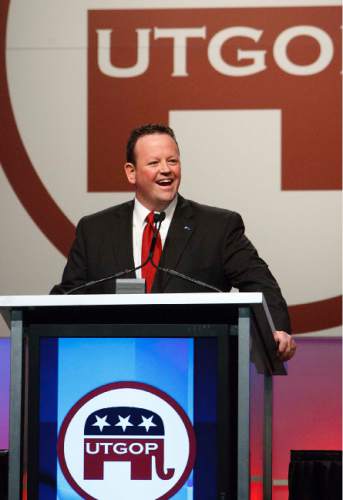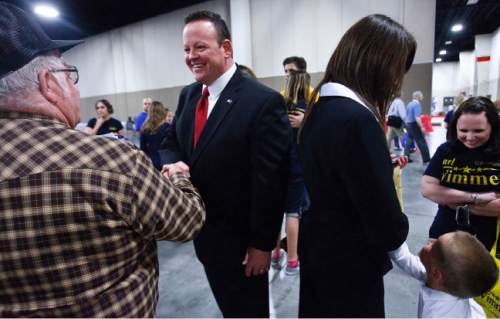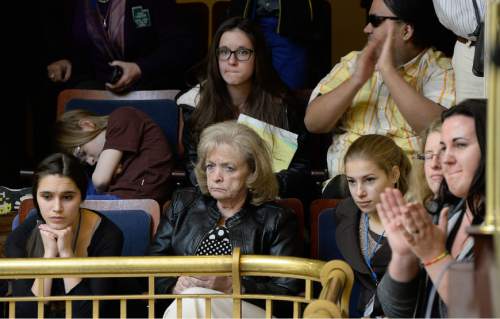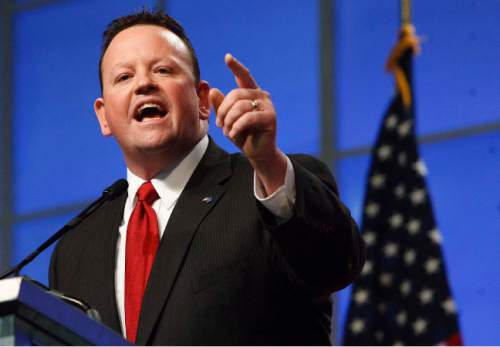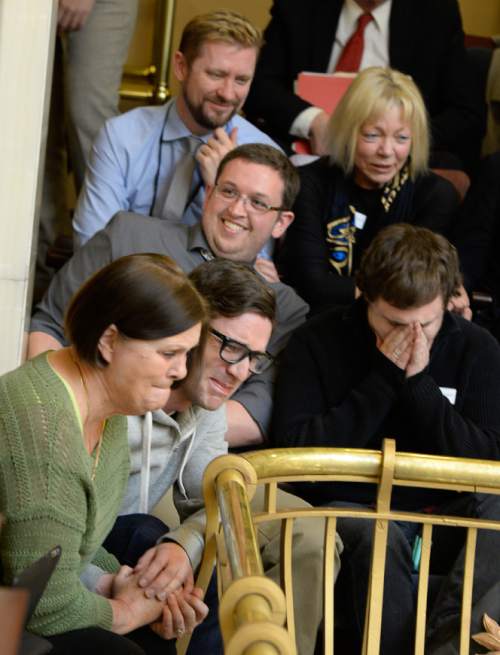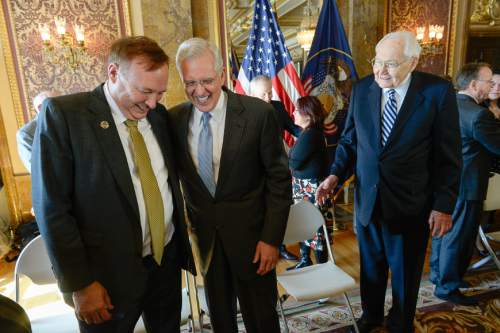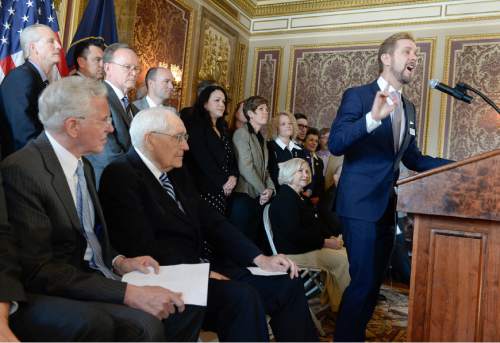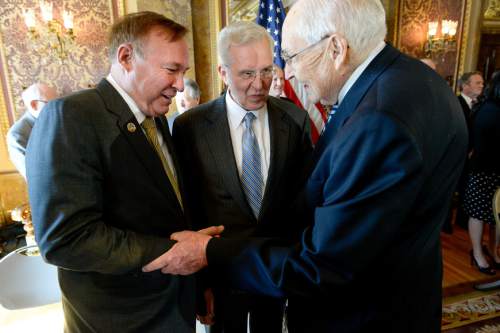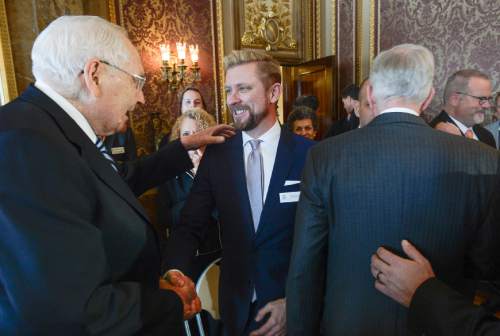This is an archived article that was published on sltrib.com in 2015, and information in the article may be outdated. It is provided only for personal research purposes and may not be reprinted.
Former state Rep. Carl Wimmer has ignited a fiery debate within Utah's political circles by accusing the LDS Church of bullying Mormon lawmakers on such controversial topics as illegal immigration, alcohol and, likely, the new law to protect gay and lesbian residents from workplace and housing discrimination.
A couple of former legislators back Wimmer, who recently left the LDS Church to become an evangelical Christian. A far larger group of Mormon lawmakers — including former Rep. Stephen Sandstrom, who sponsored immigration restrictions the church disliked — say they have never experienced the kind of heavy-handed tactics described by Wimmer in a blog post.
The one-time Herriman lawmaker's claims range from meetings between LDS Church lobbyists and select lawmakers that he compared to Mormon priesthood interviews, to an allegation that his ecclesiastical leader contacted him directly to pressure him to vote for a bill favored by The Church of Jesus Christ of Latter-day Saints.
At its core, debate about Wimmer's assertions show how individual lawmakers respond differently to political persuasion delivered in the name of revered religious leaders. And in a state where more than 80 percent of legislators are Mormon, LDS positions can virtually assure passage of a bill or stop it in its tracks.
Wimmer, who served in the House from 2007 to 2011, recounted how the church, in 2008, supported a ban on so-called "alcopops" from grocery stores, believing they were enticing young people to drink. Wimmer opposed the bill, saying he didn't want to shift a lawful product away from a private business to state-run liquor stores.
A lobbyist for the LDS Church tried to change Wimmer's mind by saying the position came "directly from the top," which Wimmer took to mean the faith's governing First Presidency. As Wimmer walked away, the lobbyist said: "Don't worry; voting against us will not affect your church membership status." He said the assurance brought him a feeling of relief, and he voted against the legislation, which passed.
—
'The brethren' • Former Rep. Chris Herrod, who is Mormon, says he never heard any church lobbyists say a position has come "directly from the top," but he has been told they were representing the view of "the brethren."
Herrod and Wimmer were allies during a tense immigration debate in 2011, which ended with approval of a Utah guest-worker program for undocumented immigrants that they both strongly opposed (a plan that never was implemented because of a lack of federal signoff.) Unlike Wimmer, Herrod, R-Provo, had little problem being on the opposite side of a political issue from his church and he wasn't convinced that every position pressed by its lobbyists came from the faith's apostles.
"What 'the brethren' actually means is something up to interpretation," Herrod said. "I felt many times it was from the brethren of the [LDS Church's] public-affairs department."
Sen. Curt Bramble, R-Provo, a big supporter of the guest-worker legislation, believes Herrod is misreading the situation. He believes any position delivered by the denomination's lobbyists, whom legislators jokingly call the "home teachers," is endorsed by LDS Church President Thomas S. Monson, his counselors and the wider Quorum of the Twelve — just as the lobbying of any interest group reflects the stance of that organization's leaders.
"I view the LDS Church in the political context as the same as any other interested observer that wants to make their position known," said Bramble, who also is Mormon.
—
High pressure • Wimmer's blog said church pressure went far beyond conversations in the back halls of the Capitol, particularly during the 2011 immigration debate.
"What bothered me most was when my local ecclesiastical leader contacted me and attempted to persuade me to vote for the bill," he wrote. Wimmer declined in an interview to identify that leader or his position, saying he did not want to cause problems for the man.
"When I asked him, 'Who from the church headquarters has asked you to contact me?' he simply confirmed that he had been asked, but would not say by whom," Wimmer wrote.
Additionally, Wimmer said church lobbyists and House leaders conducted meetings to apply pressure that members derisively called "PPIs," or personal priesthood interviews, a name the LDS Church gives to private member consultations held by leaders, and which Wimmer had himself participated in as an elders quorum president.
He said he spoke with a House colleague who told him "what he had just experienced was an intense, closed-door meeting with select members of House leadership and LDS Church lobbyists who made it abundantly clear that when HB116 [the guest-worker bill] came up for a vote, he was to support the bill, period."
A House leader told him that, if the vote was close, the leader would "have to vote for it; I have no choice."
Wimmer wrote, "There was an intensity I had never felt before or after on the House floor. It was the intensity that comes only from political bullying, and it killed me to know that this time the 'bully' was my own church." LDS Church lobbyists were so persistent on the measure that Wimmer said he finally quit taking their calls.
Wimmer explained that the "look and feel" of what happened this year on SB296, the LGBT anti-discrimination bill endorsed by the church, prompted him to "break the silence and provide some insight" — a step he said he resisted when he was a lawmaker and faithful Mormon because of the embarrassment it would have caused the church, not to mention that it would have constituted an act of "political suicide."
He said in an interview that he knows skeptics may believe he is saying about such things now only because he left Mormonism, but "I am willing to take a polygraph test to prove I am telling the truth."
—
Other lawmakers • The Salt Lake Tribune contacted about a dozen current and former lawmakers about Wimmer's assertions, and some also debated them in social media. Former Republican Rep. Ryan Wilcox, R-Ogden, offered Wimmer some support. "Carl's description of the conversations on the House floor that night [during 2011 passage of HB116] are 'exactly' as I remember them," he wrote on Facebook. Wilcox, who is LDS, left the Legislature last year to become northern Utah director for U.S. Sen. Mike Lee.
Other former colleagues, though, say Wimmer is exaggerating or just dead wrong.
The lawmakers contacted by the newspaper said they never had been lobbied by their local LDS bishop, stake president or other Mormon leader on a political issue.
"Never has this happened with me," said Sen. Scott Jenkins, R-Plain City, a former Senate majority leader.
He added he voted against SB296, the anti-discrimination bill, and LDS lobbyists "never came in and talked to me. If there had been a full-court press on it, I think they would have talked to me."
The church made its view known more openly and unequivocally on SB296 than it has on any political issue in decades, holding a news conference supporting the principles of nondiscrimination and religious liberty featuring three apostles — Jeffrey R. Holland, Dallin H. Oaks and D. Todd Christofferson — and a high-profile LDS women's leader, Neill F. Marriott.
The unusual event left some former opponents of the legislation — versions of which had met with repeated rejection in recent legislative sessions — feeling conflicted. No one expressed that as publicly as Sen. Mark Madsen, R-Saratoga Springs.
"The thing that is most frustrating to me and causes the greatest confusion to me is my church's position on this," Madsen lamented on the Senate floor. "My church is actually endorsing government to use force to compel me and my fellow citizens to live by a standard that they are not willing to live by. So I have to try to figure out — am I supposed to do as my church says I'm to do, or am I supposed to do as my church does."
In the end, he voted for SB296, mentioning the church's endorsement as the reason why.
—
A light touch • Most of the Mormon lawmakers contacted said their experiences with LDS lobbyists were brief and never included pressure to vote one way or another.
"They made very clear to me that they respected what I was doing as a representative and they wanted me to do what I felt was right," said Sandstrom, an Orem Republican who was at the forefront of a failed effort to crack down on illegal immigrants. "They were not telling me what to do."
Rep. Kraig Powell, R-Heber City, has unsuccessfully pushed legislation to remove the "Zion curtain" barrier aimed at preventing restaurant patrons from seeing alcoholic drinks being mixed or poured. He said the LDS Church lobbying he has experienced has been low key.
In fact, he said, during his first five years in the Legislature, "I never knew who a lobbyist from the LDS Church was and never spoke to one."
That changed in 2013 as he agreed to take over the Zion-curtain removal bill from another legislator and a church lobbyist called him "and wanted to get the message out why they oppose a change in the law."
Powell said he welcomed hearing the reasoning.
"I've never seen anything inappropriate or out of bounds" by church lobbyists, he said.
Sen. Todd Weiler, R-Woods Cross, said he had received a few calls from former LDS lobbyist Bill Evans, including one on a bill that would make cockfighting a felony.
"He said, 'I'm just calling to let you know that we are very interested in the bill because we feel the current laws are providing an element of gambling into the state, so we would like you to take a hard look at it,' " Weiler recalls. "It wasn't a hard sell at all. It was a very soft touch."
That conversation took place a couple of years ago. This year, the Legislature passed a bill beefing up the penalties for cockfighting.
Evans stopped lobbying for the LDS Church in late 2013. The church now has seven registered lobbyists, including John Cannon, who spent the previous 20 years as a policy analyst for the Legislature.
—
Church and state • Rep. Jeremy Peterson, R-Ogden, wrote on Facebook that he never was contacted by the church in the immigration debate, even though he co-sponsored a controversial bill. He said he did contact church lobbyists this year to "figure out what in the world they were thinking" with the anti-discrimination bill — which he opposed.
"The church lobbyists will represent the church. I will represent District 9. We can play our respective roles honestly and without angst," Peterson wrote. "Any legislator that feels stressed over these divided loyalties needs to take some time out to make peace with themselves."
Former Sen. Stuart Reid, R-Ogden, declined to comment when contacted by The Tribune, offering the explanation that he previously served as a church lobbyist and had adopted a personal policy of not discussing LDS public-affairs operations without clearance from Mormon leaders.
But in an opinion piece published last month in the Deseret News, Reid wrote about religious-freedom legislation he had drafted as a senator that never saw the light of day because of a specific request from an apostle.
"The public was never made aware of my religious freedom legislation for one reason alone: Elder Oaks personally asked me not to advance it. He felt that if I introduced my legislation, it would disrupt efforts to discover common ground for each party to obtain rights without trampling on the rights of the other."
LDS Church spokesman Eric Hawkins issued a written statement in response to Tribune questions about church lobbying in light of Wimmer's claims.
"As the church has asserted before, elected officials who are Latter-day Saints make their own decisions and may not necessarily be in agreement with one another or even with a publicly stated church position."
He added, "The church actively engages in the political process on a handful of issues — particularly when legislation involves moral issues or impacts the doctrines or practices of the church. Recent positions on immigration and religious freedom are good examples. In such instances, church lobbyists may interface directly with political leaders to represent the church's views."


